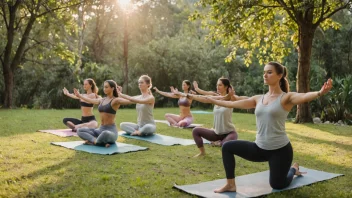In an age where the hustle and bustle of daily life can often leave individuals feeling overwhelmed and disconnected, wellness retreats have emerged as sanctuaries for rejuvenation and self-discovery. These retreats offer more than just a break from routine; they embody a philosophy centered around holistic health, mindfulness, and personal transformation. By delving into the essence of wellness retreats, we can appreciate how they foster an environment conducive to physical, mental, and spiritual healing, encouraging participants to embark on a journey of introspection and growth.
Defining Wellness Retreats
At their core, wellness retreats are immersive experiences designed to promote health and well-being through various practices. Unlike traditional vacations that prioritize leisure and entertainment, wellness retreats focus on personal development and healing. They often incorporate activities such as yoga, meditation, nutrition workshops, and nature excursions, all aimed at enhancing participants' overall well-being.
The Philosophy of Holistic Health
The philosophy underpinning wellness retreats is deeply rooted in the concept of holistic health. This approach recognizes that physical, mental, and emotional aspects of a person are interconnected and that true wellness encompasses all these dimensions. Retreats generally offer programs that address the body through physical exercises, the mind through mindfulness practices, and the spirit through reflective activities.
Mindfulness and Presence
One of the cornerstones of wellness retreats is the practice of mindfulness, which encourages participants to be present in the moment. This practice is often facilitated through meditation and breathing exercises, allowing individuals to cultivate awareness of their thoughts and feelings without judgment. By focusing on the present, retreat-goers can learn to let go of stress and anxiety, fostering a sense of peace and clarity.
Connection with Nature
Many wellness retreats are situated in serene natural environments, which play a significant role in the healing process. Nature has a profound impact on our well-being; studies show that spending time outdoors can reduce stress, improve mood, and enhance cognitive function. Engaging with the natural world during a retreat may involve hiking, swimming, or simply enjoying the tranquility of one’s surroundings, offering a refreshing break from urban life.
Community and Connection
Another vital aspect of wellness retreats is the sense of community they foster. Participants often come together with a shared intention of self-improvement, creating a supportive network that encourages openness and vulnerability. This sense of belonging can be incredibly healing, allowing individuals to connect with others who share similar experiences and challenges.
Group Activities and Workshops
Many retreats include group activities, such as cooking classes, art therapy, or group discussions, which facilitate interpersonal connections. Sharing personal journeys and insights can lead to powerful bonding experiences, making the retreat not just a personal journey but a collective one. This shared experience often leads to lasting friendships and a sense of accountability that can continue long after the retreat ends.
Personal Transformation and Growth
Wellness retreats are often transformative experiences that encourage participants to reflect on their lives and make positive changes. Through a combination of guided practices and personal exploration, individuals can identify patterns or habits that no longer serve them. This process of self-discovery can empower participants to set intentions for their lives moving forward, fostering a proactive approach to wellness.
Setting Intentions and Goals
Many retreats include goal-setting workshops that guide participants in articulating their aspirations. By clarifying their intentions, individuals can return home with a renewed sense of purpose and motivation. The combination of learned skills, community support, and personal reflection can be a catalyst for lasting change.
Choosing the Right Retreat
With a plethora of wellness retreats available worldwide, selecting the right one can be daunting. Considerations should include the retreat's focus, location, duration, and the qualifications of the facilitators. It is essential to choose a retreat that resonates with your personal goals and needs, whether you seek relaxation, spiritual growth, or a complete lifestyle overhaul.
Researching Retreats
Before committing to a retreat, take the time to research various options. Read reviews, explore the itinerary, and assess the experience of the instructors. Many retreats also offer virtual tours or informational webinars, providing potential attendees with a clearer picture of what to expect.
Incorporating Wellness into Daily Life
While wellness retreats offer an immersive experience dedicated to health and personal growth, the ultimate goal is to integrate the lessons learned into everyday life. After returning home, participants can continue practicing mindfulness, engaging in regular physical activity, and nurturing connections with others. The insights gained during a retreat can serve as a foundation for a more balanced and fulfilling life.
Conclusion
Wellness retreats represent a profound journey into the self, allowing individuals to reconnect with their bodies, minds, and spirits. The philosophy behind these retreats emphasizes a holistic approach to health that values mindfulness, nature, community, and personal transformation. By understanding the principles that guide wellness retreats, travelers can make informed choices that lead to enriching experiences, fostering a deeper sense of well-being that lasts long after the journey ends.






